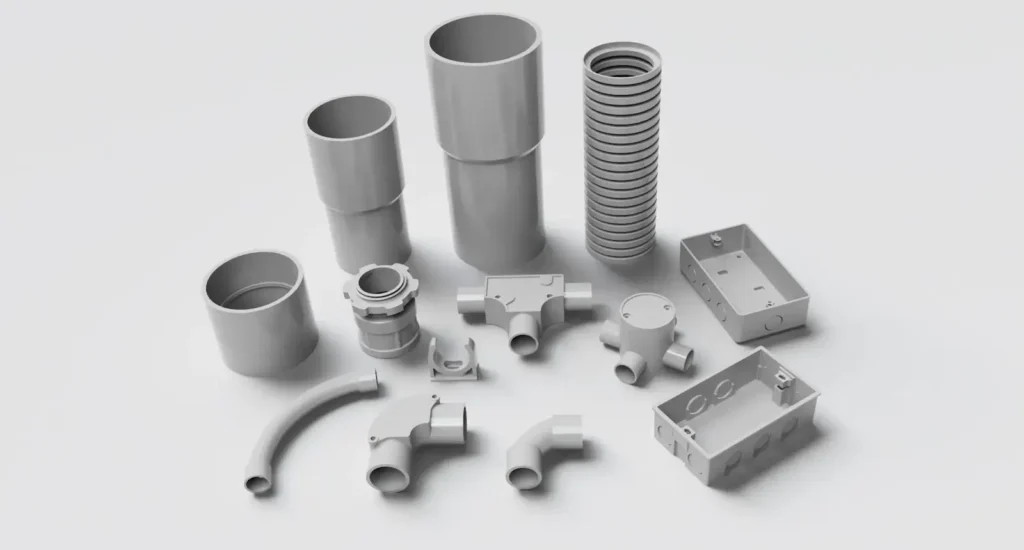The advantages of PVC conduit and fittings
As an electrical engineer, I understand the importance of choosing the right conduit and fittings for electrical systems. One material that has gained popularity over the years is polyvinyl chloride (PVC) conduit and fittings.
In this article, we will discuss the advantages of using PVC conduit and fittings in electrical installations.
PVC conduit is a type of plastic tubing that is commonly used to protect electrical wires and cables. PVC conduit fittings, on the other hand, are used to connect and secure sections of PVC conduit together. PVC conduit and fittings have several advantages over other materials such as metal conduit and fittings.
Durability and Longevity
One of the biggest advantages of PVC conduit is its durability and longevity. PVC is a very durable material that can withstand harsh weather conditions, making it a great choice for outdoor installations. Additionally, PVC conduit does not rust or corrode, which extends its lifespan and reduces the need for maintenance.
Lightweight and Easy to Install
PVC conduit is also lightweight and easy to install. Its lightweight nature makes it easier to handle and transport, which reduces installation time and labor costs. PVC conduit can also be cut to fit specific lengths and angles, making it more versatile than other materials.
Corrosion-Resistant
PVC conduit is also corrosion-resistant. Unlike metal conduit, PVC does not rust or corrode, which makes it a better choice for corrosive environments. This is particularly important for outdoor installations, where the conduit is exposed to rain, snow, and other harsh weather conditions.
Low Cost
PVC conduit is also cost-effective. PVC is less expensive than other materials such as steel and aluminum, which makes it a more economical choice for electrical installations.
Fire-Resistant
PVC conduit is also fire-resistant. PVC is a self-extinguishing material, which means that it will not continue to burn once the source of the fire is removed. This makes PVC conduit a safer choice for electrical installations. Non-Conductive Lastly, PVC conduit is non-conductive. This means that it does not conduct electricity, which reduces the risk of electrical shock. PVC conduit is a safer choice for electrical installations than metal conduit, which can conduct electricity. Advantages of PVC Fittings In addition to the advantages of PVC conduit, PVC fittings also offer several benefits:
Versatility in Design and Application
PVC fittings are highly versatile in their design and application. They come in a wide variety of shapes, sizes, and angles, which makes them adaptable to different electrical systems. Additionally, PVC fittings can be molded into custom shapes, which makes them ideal for specialized applications.
Easy to Install and Remove
PVC fittings are also easy to install and remove. They can be easily attached to PVC conduit with cement or adhesive, and they can also be easily removed if necessary. This makes PVC fittings a more flexible choice than other types of fittings.
Cost-Effective
PVC fittings are also cost-effective. Like PVC conduit, PVC fittings are less expensive than other materials such as metal fittings. This makes them a more economical choice for electrical installations.
Resistant to Chemical and UV Exposure
PVC fittings are also resistant to chemical and UV exposure. They are not affected by most chemicals and solvents, which makes them a better choice for installations in environments where these substances are present. Additionally, PVC fittings are resistant to UV radiation, which makes them ideal for outdoor installations.
Good Mechanical Strength Lastly
PVC fittings have good mechanical strength. They are able to withstand moderate loads and forces, which makes them a reliable choice for electrical systems.
Applications of PVC Conduit and Fittings PVC conduit and fittings are widely used in various applications, including residential, commercial, and industrial electrical installations. They are also commonly used in outdoor installations such as street lighting and telecommunications.
In conclusion, PVC conduit and fittings offer several advantages over other materials such as metal conduit and fittings. PVC conduit is durable, lightweight, corrosion-resistant, low cost, fire-resistant, and non-conductive. PVC fittings are versatile, easy to install and remove, cost-effective, resistant to chemical and UV exposure, and have good mechanical strength. When it comes to selecting the right conduit and fittings for your electrical system, PVC conduit and fittings are a reliable and cost-effective choice.
The advantages of PVC conduit and fittings 阅读更多 "

